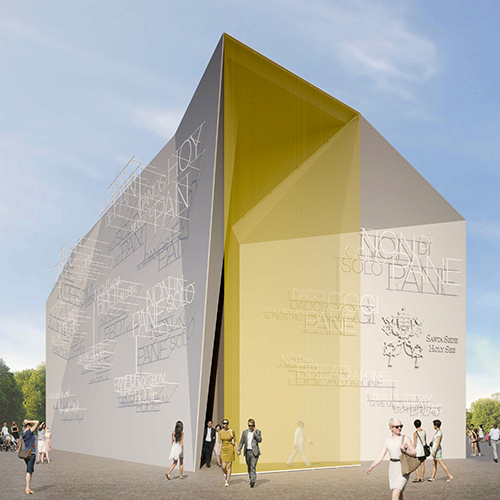By Tom Tracy - Florida Catholic
See related story: Holy See confronts hunger at Milan’s World’s Fair
MIAMI | The lead scientist coordinating events at the Vatican’s Expo 2015 pavilion said he hopes the Church’s efforts there will create a “cultural legacy” of awareness about hunger issues, as well as point toward new efforts to reduce hunger and food waste worldwide.
The pavilion will be hosting no less than 10 official events and academic meetings this summer promoted by the Holy See, including a three-day symposium, “Right to Food, Peace, Democracy,” set for late summer on the Expo grounds northwest of Milan.
The entire planet is facing a huge challenge in the coming decade in terms of how to feed its nine billion people in a sustainable way, without destroying the delicate equilibrium between human actions and environmental resources, according to Pier Sandro Cocconcelli, a food safety expert.

Photographer: COURTESY PHOTO | Holy See Press
Artist's rendering shows the exterior of the Holy See's 747-square-foot pavilion at the Milan Expo 2015. The words "Not by bread alone" convey the theme, a Gospel take on the Expo's focus, "Feeding the Planet, Energy for Life." Also written in 13 languages is the phrase: "Give us this day our daily bread."
Cocconcelli is chair professor of food microbiology at the Institute of Microbiology/Faculty of Agriculture, Food and Environmental Sciences at Universit� Cattolica del Sacro Cuore (Piacenza Campus). He also serves as director of UCSC ExpoLAB, a multidisciplinary center which conducts research and activities with national and international universities and partners related to Expo Milan’s overall theme: “Feeding the Planet. Energy for Life.”
Cocconcelli told The Florida Catholic by email that world hunger is far from being eradicated. It is estimated that there are still 800 million people suffering malnutrition and that 30 percent of the food production is wasted.
“Foodborne disease is still a relevant burden in certain geographical and political areas; for instance in Africa more than 600,000 people die due to diarrheal disease and most of them are related to the consumption of contaminated foods and water,” he said. “Moreover, there is a direct relationship between democracy-peace and food security and food safety.”
Looking at this situation, Cocconcelli noted that it seems difficult to provide fully satisfactory solutions, but that Church agencies and Catholic universities can contribute to the process by focusing on food research, education and ethics.
“Science and research can propose new solutions for a cultivated planet; a sustainable intensive agriculture which exploits the natural biodiversity for drought and salt-resistant plant varieties, and uses innovative approaches such as the blue agriculture � the precision farming � (is) just one of several examples of best practices that can be successfully applied,” he said.
“The (September) colloquium at the pavilion aims to advance solid and innovative perspectives on the right to food and its ethical and political implications by aggregating ideas, values and experiences from all over the world,” said Cocconcelli, who was on hand for the May 1 opening ceremonies of the World’s Fair.
He said he observed strong interest in the Holy See’s pavilion, located on the “decumano” � the main street of Expo 2015 � and in a very central position. The simplicity of its external design contrasts with the many other national pavilions, he added.
Inside the pavilion, a photographic exhibit and video installation attract the visitors’ attention to the big themes of the Expo and to the topics of a right to food, inequalities, and loss and waste.
“It strives to be a clear message that stimulates a critical thinking in the visitors,” Cocconcelli said. “We hope the scientific conversation during the colloquium will lead to significant propositions for promoting justice and peace for the human family, to be the cultural legacy of Expo 2015.”

